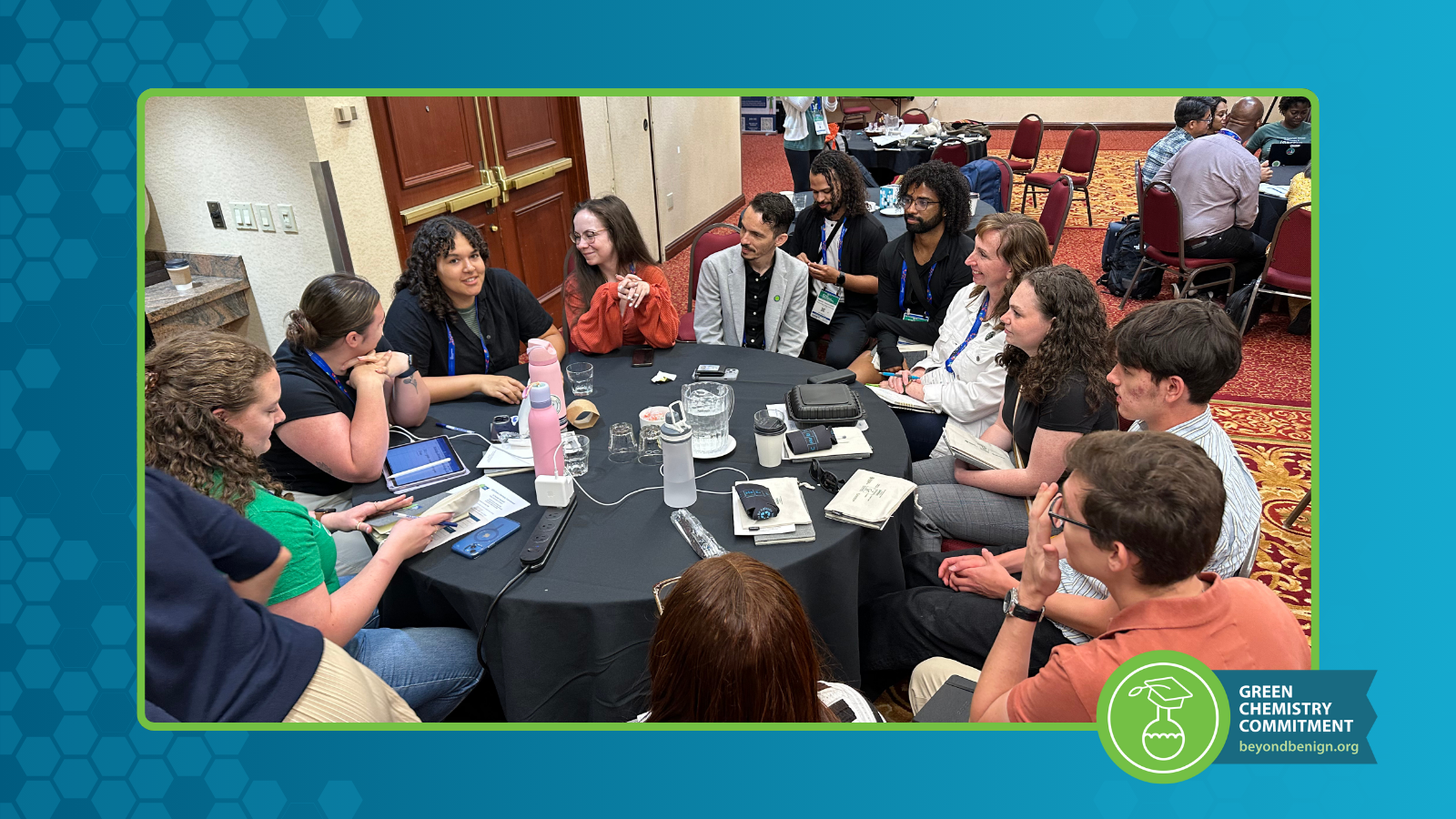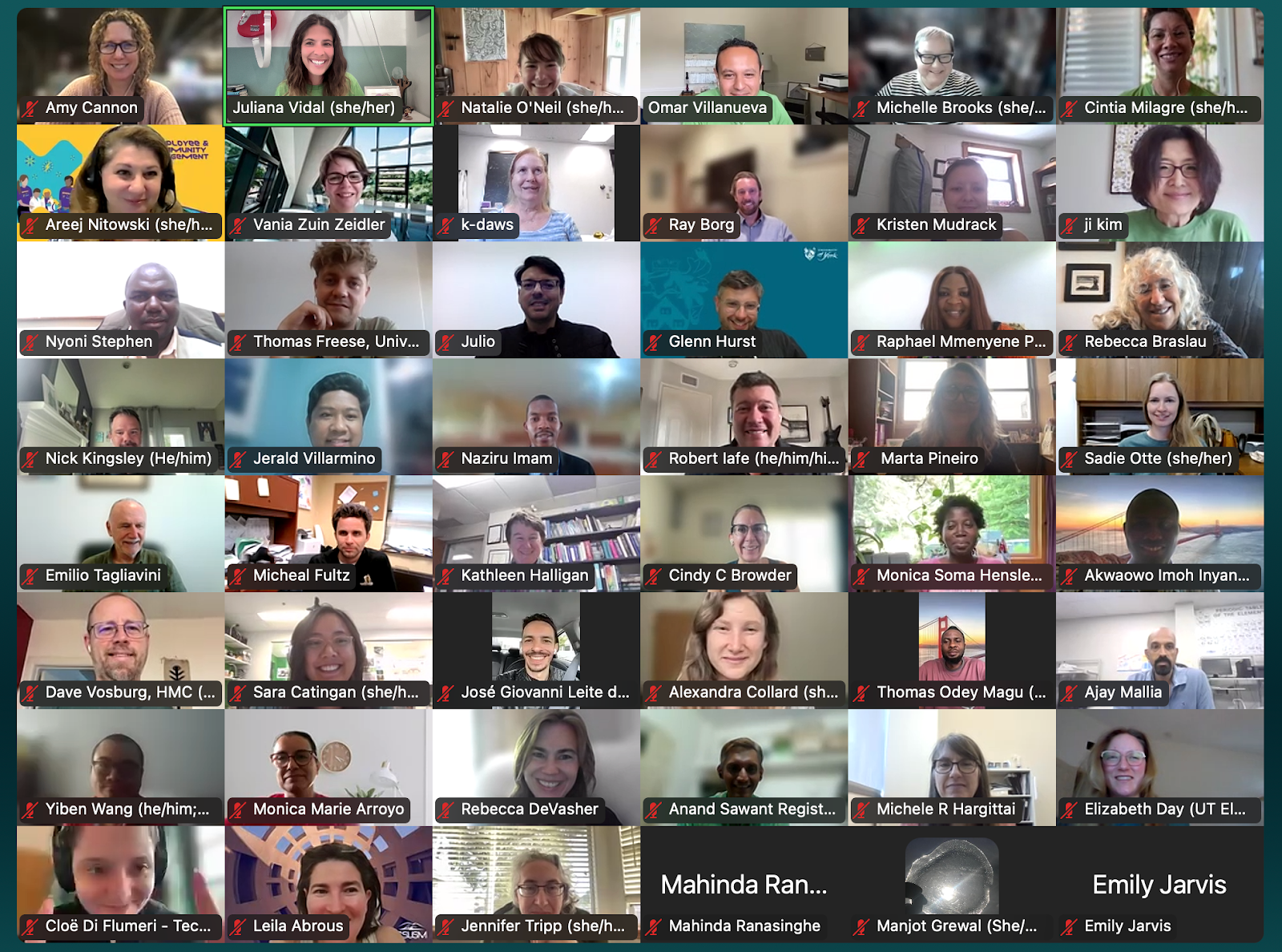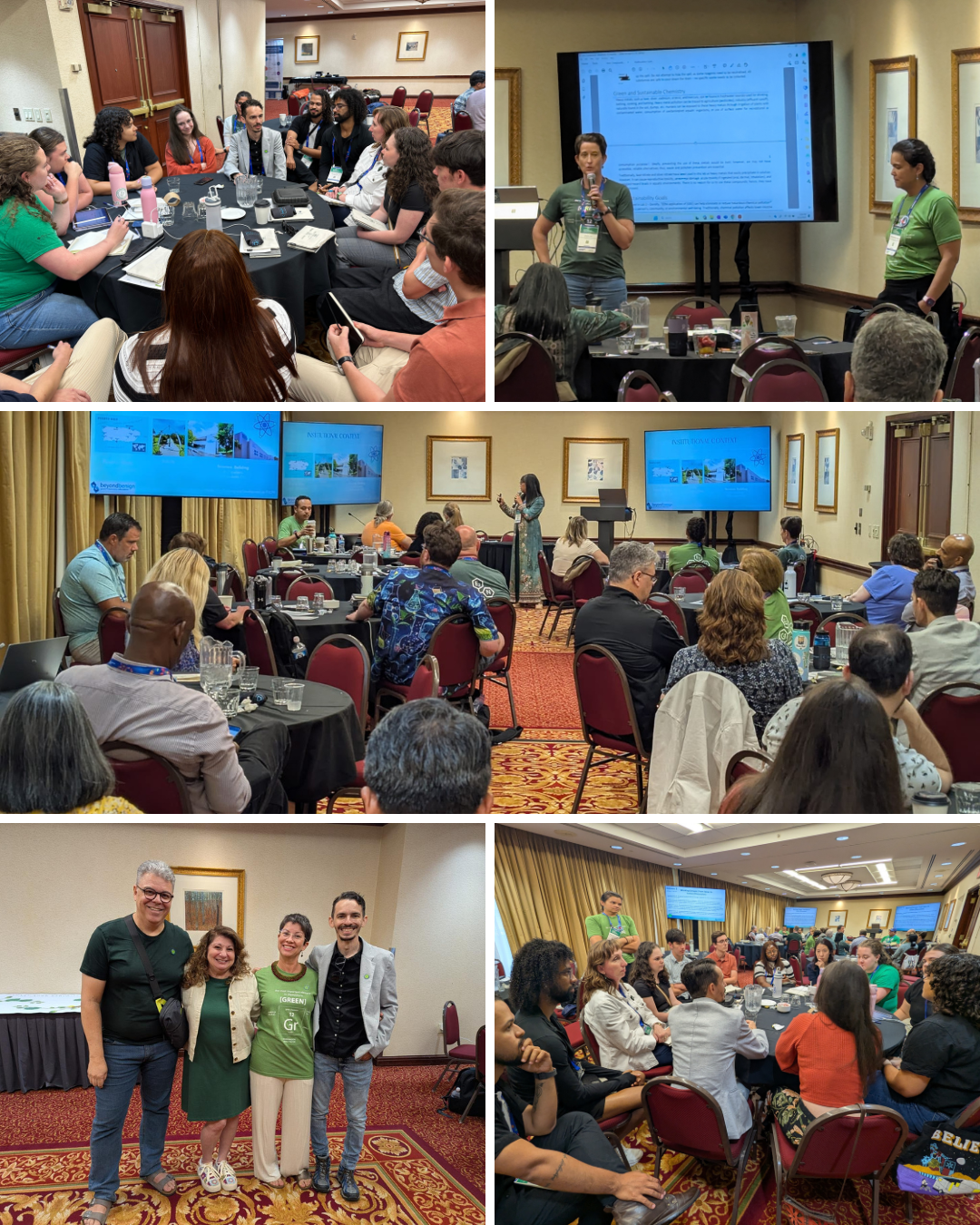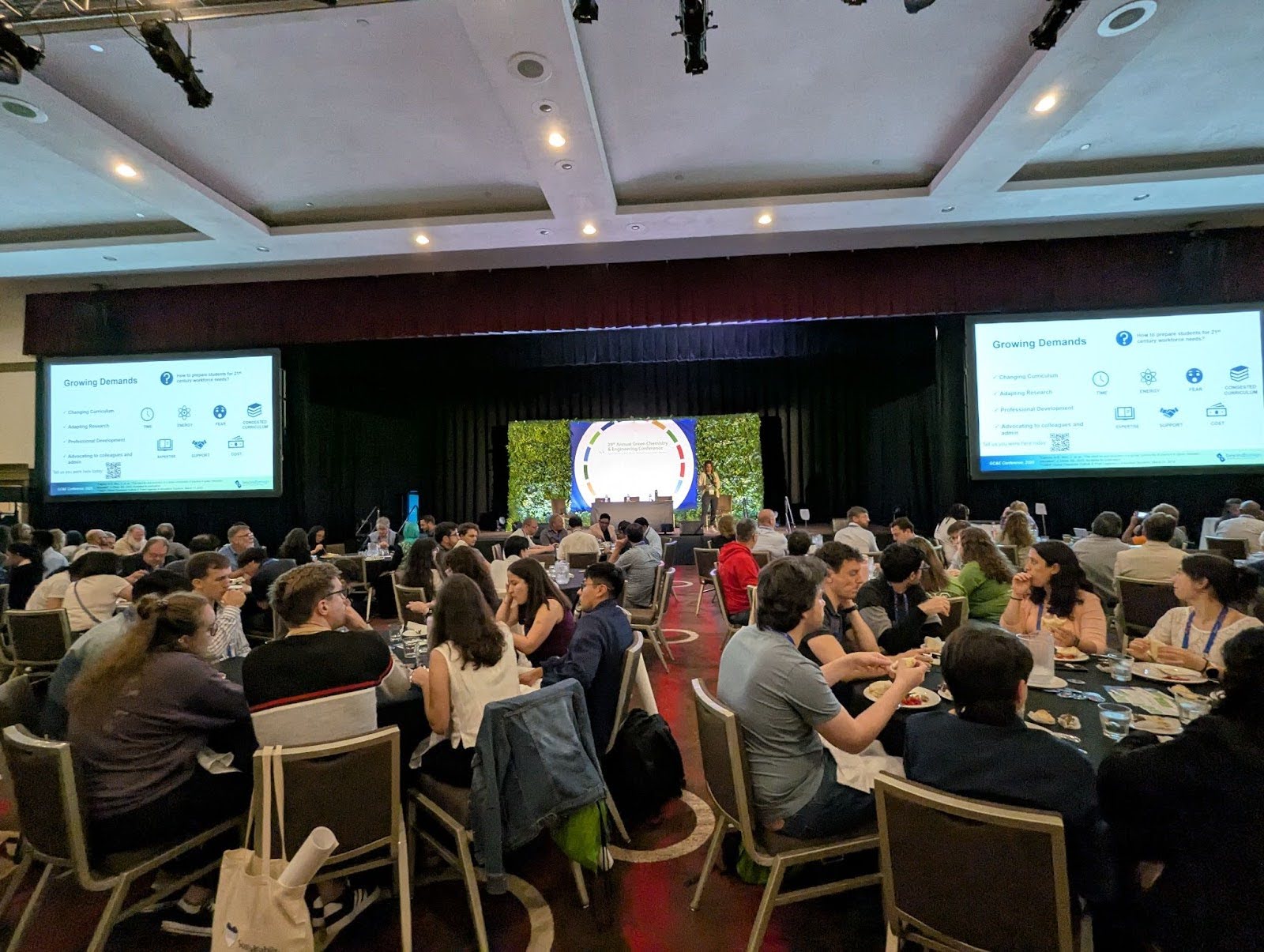 Each year, Beyond Benign’s Green Chemistry Commitment (GCC) Summit brings together a global community of educators and changemakers who are reimagining how chemistry is taught—and why it matters. The 2025 gatherings, held both virtually and in person, showcased the powerful momentum of this growing movement.
Each year, Beyond Benign’s Green Chemistry Commitment (GCC) Summit brings together a global community of educators and changemakers who are reimagining how chemistry is taught—and why it matters. The 2025 gatherings, held both virtually and in person, showcased the powerful momentum of this growing movement.
Celebrating the GCC Community
The 2025 GCC Summit embraced a hybrid format that reflected the expanding reach and adaptability of the community. More than 70 participants joined the virtual gathering on June 18, while over 60 attended the in-person event on June 22 at the Green Chemistry & Engineering Conference (GC&E) in Pittsburgh, Pennsylvania. Whether connecting via Zoom or sharing space in a conference room, participants came ready to exchange ideas, celebrate progress, and deepen the collaborative spirit that defines the GCC network.
The community-building didn’t stop there. On the evening of June 22, GCC members gathered for a Student-Faculty Social Event co-hosted with MilliporeSigma, the U.S. and Canada Life Science business of Merck KGaA, Darmstadt, Germany, and the American Chemical Society (ACS) Green Chemistry Institute. With trivia games, laughter, and new introductions, the event offered a relaxed space to connect across roles and campuses. A few days later, the Catalyzing Change in Chemistry Education Luncheon welcomed 119 attendees—including many faculty, several of whom were new to the GCC—for a candid and energizing conversation about embedding green chemistry more deeply in higher education.
Together, these events reflected the heart of the GCC: a vibrant international community united by a shared purpose. Whether joining from a screen or across a lunch table, participants walked away with new ideas, renewed energy, and the unmistakable sense that they’re part of something bigger.
GCC Summit Highlights: Key Conversations & Catalysts

Participants from around the world gathered online for the 2025 Virtual GCC Summit.
Across two dynamic gatherings, the 2025 GCC Summit brought the community together to explore how green chemistry is taking root and scaling across higher education. Through keynotes, panels, and working sessions, a few themes rose to the top:
1. Aligning with Big Levers for Change
From updates to the ACS Guidelines to region-wide strategies emerging in Brazil, the Summit highlighted how professional societies and policy frameworks are shaping the future of green chemistry in academia. Speakers from the ACS and the Royal Society of Chemistry offered perspectives on how top-down influence can accelerate curriculum transformation and institutional adoption.
2. Making the Case for Green Chemistry in Industry
In panels featuring leaders from MilliporeSigma, Dow, Pfizer, and others, industry voices reinforced a powerful message: Green chemistry isn’t just good for the planet—it’s an essential skill set for today’s workforce. Participants heard how sustainability goals are influencing hiring decisions, innovation priorities, and cross-sector collaboration.
3. Stories of Progress from the GCC Network
Throughout both Summits, faculty and partner organizations shared candid stories of how they’re embedding green chemistry into coursework, labs, and departmental culture. Award-winning initiatives ranged from lab redesigns and final project integration to cross-campus partnerships that center student leadership. These case studies provided replicable models and inspiration for attendees to take back to their own institutions.
4. From Ideas to Action: Collaborative Planning
Both events featured hands-on working groups where participants tackled key challenges, like student engagement, faculty buy-in, lab sustainability, and professional development. Using a shared reflection and action planning framework, attendees left with goals, strategies, and new connections to help move the work forward on their campuses.
5. A Celebration of Community and Commitment
In both virtual and in-person formats, the GCC Summit served as a reminder that this work is never done alone. The tribute to Dr. Ed Brush, a longtime champion of green chemistry education, underscored the strength of the network and the deep personal commitment driving this movement.

Snapshots from the in-person GCC Summit at the 2025 GC&E Conference, where participants shared ideas, strategies, and inspiration to advance green chemistry education.
Catalyzing Change: Insights from the Luncheon
While not formally part of the GCC Summit, the Catalyzing Change in Chemistry Education luncheon offered a powerful companion to the week’s events, especially for those new to the GCC. With more than 110 attendees, many of whom were just beginning to learn about the GCC, the luncheon created a space to explore what green chemistry integration can look like in practice and why it matters. Co-hosted with MilliporeSigma, the panel featured educators sharing candid reflections on institutional change, curriculum reform, and the power of community.

The Catalyzing Change in Chemistry Education luncheon brought together more than 100 faculty members—many new to the GCC—to explore what green chemistry can look like on their campuses.
Moderated by Amy Cannon (Executive Director, Beyond Benign) and Jeffrey Whitford (Vice President, Sustainability & Social Business Innovation, MilliporeSigma), the panel featured candid reflections on implementing green chemistry at the institutional level. Panelists included Prof. Glenn Hurst (University of York, UK), Prof. Loyd Bastin (Widener University, USA), and Prof. Flavia Zacconi (Pontificia Universidad Católica de Chile)—each sharing insights on building departmental buy-in, embedding green chemistry into curricula, and overcoming institutional barriers.
“The Green Chemistry Commitment was the catalyst that propelled green chemistry out of organic chemistry and into our curriculum. It also gave us goals for what we wanted to do in the future. So it gave us that framework about how we could scaffold green chemistry through the curriculum rather than it being part of the organic chemistry curriculum.” – Dr. Glenn Hurst, University of York
For many, the Commitment has helped unlock new partnerships and visibility. And perhaps most powerfully, it has provided a sense of shared purpose in what can sometimes feel like lonely institutional change work:
“This is the most important thing about the green chemistry commitment. For me personally, it has provided me with amazing networks that have led to many collaborations.” – Flavia Zacconi, Pontificia Universidad Catolica De Chile
Taken together, the insights shared at the luncheon underscored what many GCC members already know: Change happens faster and with greater impact when it’s grounded in both structure and community.
#GreenChemistryinAction: A Hashtag, A Movement
In conjunction with the 2025 Summit, Beyond Benign launched the #GreenChemInAction campaign to spotlight how members of the green chemistry community are advancing change in their own classrooms, labs, companies, and institutions. Participants from around the world shared reflections, visuals, and declarations of action, showcasing the depth and diversity of this growing movement.
The result was a vibrant, global snapshot of green chemistry in practice, filled with purpose, creativity, and momentum. You can still explore the campaign and see the community in action by browsing #GreenChemInAction on social media or visiting the GCTLC forum to view more posts.
Looking Ahead
As the GCC community continues to grow, so does the momentum for lasting change in chemistry education. Beyond Benign remains deeply committed to empowering educators, students, and institutions on this journey, whether they’re just beginning to explore green chemistry or already embedding it across their curriculum.
While plans for the next GCC Summit are already taking shape, the Green Chemistry Teaching and Learning Community (GCTLC) remains the best platform for staying connected between events. Through the GCTLC, members of the higher education community can find year-round opportunities for mentorship, collaboration, and resource sharing. With new functionality like topic-specific groups, it’s easier than ever to join conversations and build connections with others working toward similar goals.
For those interested in taking the next step by becoming a GCC signer, you can learn more about what’s involved—and how to get started—by visiting the GCC program page.
Together, this community is not just imagining a better future for chemistry education—it’s actively creating it.
